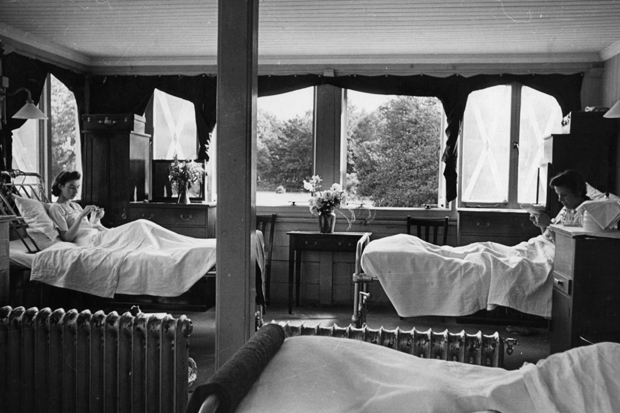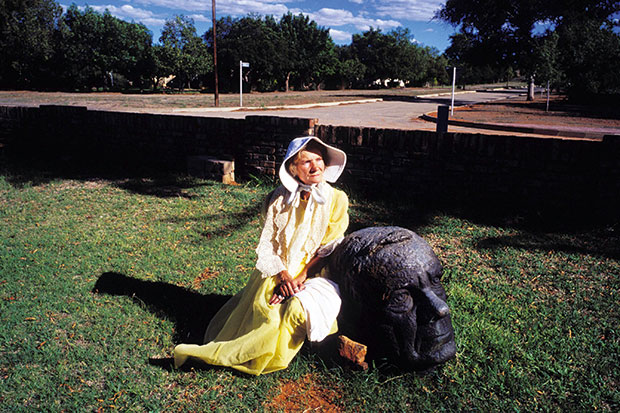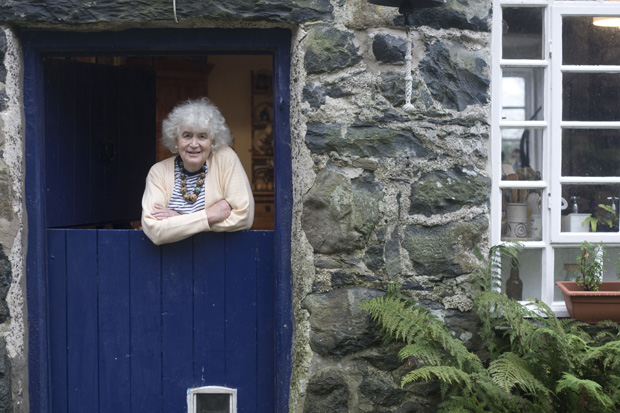If you are 70-plus, the shadow of TB will have hung over your childhood and youth, as it did mine, and Linda Grant’s new novel strikes many a chord. My maternal aunt had the disease, and spent months in a sanatorium like the one described in The Dark Circle, but finally had a thoracotomy (removal of a lung and seven ribs). She was also given the ‘new’ wonder drug Streptomycin and together with the operation, it cured her to live until she was 86. From the sanatorium, she sent me drawings of herself lying under a blanket on the freezing terrace halfway up a mountain.
I only include these personal notes because I remember the whole drama vividly, even though I was only six or seven, and Grant’s novel, set in 1949, rings as true as if she herself had experienced life in the Gwendolyn Downie Memorial Hospital for TB patients. The descriptions of the atmosphere, the sense of sickness and timelessness and despair, the half-hearted attempts at camaraderie, the horrible medical procedures, the way everyone coughed and spat into handkerchiefs and had to take their own temperatures are exactly right — as my aunt’s letters (sparing a child nothing) attested.
London Jewish twins Lenny and Miriam are in their early twenties and apparently full of life when they both contract TB and are sent to the ‘Gwen’. They have been as close as two peas in a pod, sharing everything, including a room, from birth, until they enter the sanatorium in Kent and are separated. Their relationship, especially Lenny’s fierce, protective devotion to his sister, is unusual and moving. They are adults, they have experienced adult life in the city — and yet in some essential way they are still children.
Life in the hospital separates them and also forces them into the company of
others, either those not on full bed rest and able to eat in the canteen, or some, like Valerie (whom Miriam befriends), who lie in the cold all day on the verandah to ‘benefit’ from the fresh air. Valerie is deteriorating, but Miriam — the like of whose curiosity and boldness Valerie has never encountered — lifts her out of depression and loneliness by sheer force of personality. In her turn Valerie, with an English degree from Cambridge, reads books from the library aloud. Miriam, and then Lenny too, respond to Kafka and George Eliot with an honesty and freshness which touch the heart.
But the ‘Gwen’ has its dark secrets. It was founded as a private nursing home, not for the likes of Lenny and Miriam, but then requisitioned by the NHS, although with the same doctor in charge. Dr Limb has his own secrets, and his own reasons for failing to obtain Streptomycin for all his patients. Something has to be done, and is done, and at this point, plot takes over — a slightly unconvincing plot. There has been so much depth and richness, so much human subtlety, that what happens next is of far less moment.
The novel is divided into three parts. The first two are very good indeed, unusual, original, often very funny, moving and even informative — and there is nothing wrong with fiction that teaches. It is the third part with which I have a quarrel, in that it is redundant. It is as well written as the rest but we do not need to catch up with the characters as they have aged and moved on, married, lived or died. The power of the scenes set in London, and then in the sanatorium, are diluted as they recede in time.
But I still doubt if we will read a more distinctive work of fiction for many months, or a writer whose language crackles with vitality and whose descriptive powers are working at such a high level:
The undertaker had taken their father away to prepare him to be buried in the ground like a gnawed bone. Their mother’s face lost all form. Her features slid around on it.
There are laughs too, and those are even harder to extract from a reader.
‘What did you think, Valerie ?’ said Lenny.
‘It’s not really to my taste, but I can see the essential appeal of it, in a raw kind of way. It’s quite interesting.’
‘She talks like that sometimes,’ said Miriam. ‘Pay no attention.’
Makes your ears twitch.
The post TB or not to be appeared first on The Spectator.
Got something to add? Join the discussion and comment below.
Get 10 issues for just $10
Subscribe to The Spectator Australia today for the next 10 magazine issues, plus full online access, for just $10.
You might disagree with half of it, but you’ll enjoy reading all of it. Try your first month for free, then just $2 a week for the remainder of your first year.














Comments
Don't miss out
Join the conversation with other Spectator Australia readers. Subscribe to leave a comment.
SUBSCRIBEAlready a subscriber? Log in